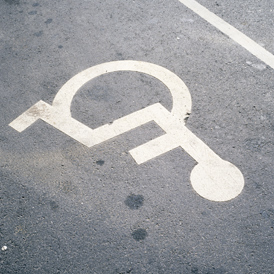Welfare reform – why disabled people are worried
As the House of Lords debates the welfare reform bill, Lisa Egan explains why she and other disabled people are concerned about the government’s plans.

This week sees developments in two areas of the welfare reform bill which potentially have huge impacts on disabled people. The benefits affected are disability living allowance (DLA) and employment and support allowance (ESA).
DLA is paid to 3.2 million disabled people. Despite what you may read in the tabloids, DLA is not an out-of-work benefit. If you need to use a wheelchair or someone to help you get out of bed, you will still have those needs if you work; so the benefit to pay for that help stays with you too.
Government ‘misrepresentation’
A year ago the government consulted the public on getting rid of DLA and replacing it with a new benefit called personal independence payment (PIP) and produced a report based on consultation responses which was presented to MPs and peers as “proof” that disabled people broadly supported the changes.
The point of reforming DLA is to cut the disability living allowance budget by 20 per cent, despite the fact that only 0.5 per cent of claims are fraudulent.
However, this week a group of disability rights activists published a report based on freedom of information requests called Responsible Reform (referred to on Twitter as #spartacusreport), which showed that the government claims of support from the disabled community were misrepresentations.
The Department for Work and Pensions (DWP) has refused to finalise PIP criteria until after the welfare reform bill has passed, but the proposals would remove so much support from so many disabled people that we’re terrified because the results could be so devastating.
The point of reforming DLA is to cut the disability living allowance budget by 20 per cent, despite the fact that only 0.5 per cent of claims are fraudulent . This means the cut is an attack on genuinely disabled people and it’s not a fraud-busting measure, so of course we don’t support the changes. Responsible Reform proves that the DWP misled the Commons and Lords by telling them we did approve.
A DWP spokesperson told Channel 4 News: "The current benefit system is not always reaching those who need it most. That is why we are reforming DLA, replacing it with the personal independence payment. This will include a new face-to-face assessment and regular reviews - something missing in the current system - to make sure people are getting the right levels of support.
"Our reforms to incapacity benefit show that we are committed to helping thousands of people move from benefits and back into work and not writing people off as happened in the past. Those found too sick or disabled to work won't be expected to and will continue to receive the help and support they need."
‘Difficult to claim’
The other big welfare story this week is ESA, the benefit for people who are unable to work for health reasons which was introduced by the Labour government to replace incapacity benefit. It is notoriously difficult to claim ESA because the assessment process is so very brutal. There are two types of ESA: contributory ESA and income-based ESA.
Income-based ESA is a means-tested benefit, so to get it you have to have almost no savings and no other income in your household (for example, a working partner). Contributory ESA, however, isn’t means tested, so can be paid to people with large nest eggs, who live with a working partner or who have received compensation payouts. But it is only available to people who’ve paid a certain amount of national insurance contributions.
Lord amendment
The welfare reform bill in its current state would limit the time people can claim contributory ESA to only one year. This means that if you develop a condition such as cancer and you have a partner who earns more than £7,500 a year, you will lose your income after 12 months and the pair of you would be forced to get by on your partner’s income.
Lords Patel and McKenzie have put forward an amendment to lift the 365-day limit, and the Lords will be voting on this amendment on Wednesday. People who are currently disabled are scared the amendment will be rejected; but this will also have implications for anyone becoming ill or impaired in the future who thought they would get support from the welfare state they paid into.
Disabled people aren’t asking for funding to live lavish lifestyles.
Disabled people aren’t asking for funding to live lavish lifestyles. We’re not even fighting for more money than we already have, despite the fact that in early 2011 I calculated that my weekly income for 2010 was £67 short of the amount the Joseph Rowntree Foundation recommend for a minimum standard of living. We just don’t want to see the support we depend on removed.
There have already been several suicides associated with not getting benefits in the previous 18 months. That was just admin errors and overzealous assessors. if vast swathes of people lose benefits they’d previously been eligible for, that list will explode.